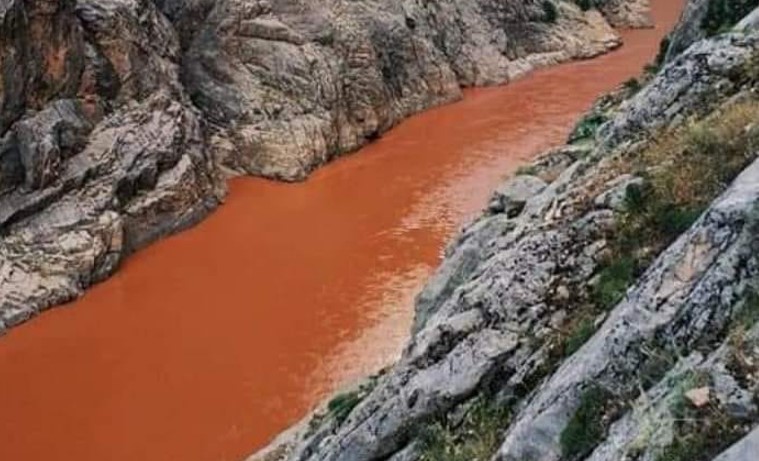The leak of cyanide waste from a gold mining site in eastern Turkey has raised concerns about widespread environmental damage in the area, which is close to the Euphrates River, according to reports in the Turkish media.
A damaged pipe used at the Çöpler gold mine in the İliç district of Erzincan province started spilling cyanide waste on June 21. The co-operators of the mine are Anagold Madencilik and the pro-government Çalık Holding.
Anagold confirmed the reports of a cyanide leak from its mining site in a written statement on its website on Monday, saying the spill contained about 8 kilograms of depleted cyanide and that it was “cleaned immediately,” denying reports about any environmental impact.
“Unfounded claims that circulated on social media that there are tons that spilled and that [the spill] was affecting the Euphrates River are completely wrong,” the company said, with the Erzincan Governor’s Office also confirming that the leak didn’t affect the Euphrates River.
However, many environmental activists and some opposition politicians claimed that the actual amount of the spill was as high as 20 tons.
Ali Öztunç, the vice chair of the main opposition Republican People’s Party (CHP), warned that the cyanide spill could cause damage similar to that of the Chernobyl disaster of 1986, accusing Turkish authorities of “remaining silent in the face of such destruction of nature,” according to a report in the Cumhuriyet daily on Tuesday.
“[Murat Kurum] is the environment minister, but he is silent regarding such destruction [of nature]. He is the most incompetent environment minister. This is the Chernobyl [disaster] of Turkey. The Keban Dam, Sivas, Tunceli [provinces] are at risk. … Everything that [contaminated] water touches will die. Agriculture will end wherever the water goes. People will not be able to cultivate their fields,” Öztunç added.
Underlining that 20 tons of cyanide had mixed into soil and water, Öztunç said the ruling Justice and Development Party (AKP) was responsible for the disaster.
Following the reports of the spill, Turkey’s Environment, Urbanization and Climate Change Ministry said that mining activities in the area can’t continue until work is undertaken to remedy the situation. The ministry also imposed an administrative fine of 16.4 million lira ($991,000) on the operator.
Füsun Kayra from the İliç Basin Nature and Environment Platform on Tuesday told Cumhuriyet that Anagold had been operating in the region for 12 years and that the latest accident wasn’t the first.
“We have videos showing that cyanide has mixed into the water. They [the authorities] will allocate the entire area to the mine. A joint front is needed. These are [acts of] destruction [of nature], and they are irreversible. They shouldn’t be just punished and covered up,” Kayra said.
Metallurgical engineer Cemalettin Küçük also told Deutsche Welle Turkish service on Monday that although Anagold came to the fore with cyanide spill, a toxic chemical, the company’s activities in the area caused much more harm to the environment than that, adding that the fine imposed on the operator wouldn’t cover it.
Heavy metals such as zinc, nickel, copper, iron and arsenic, which are dissolved with gold during the processing of cyanide, have serious effects on human health, according to Dr. Ahmet Soysal from the Association of Public Health Professionals (HASUDER), who told DW that mines that work with cyanide have posed a risk of heavy metal pollution in the region where they’re located for decades and that it could reach people through food and nutrients.



